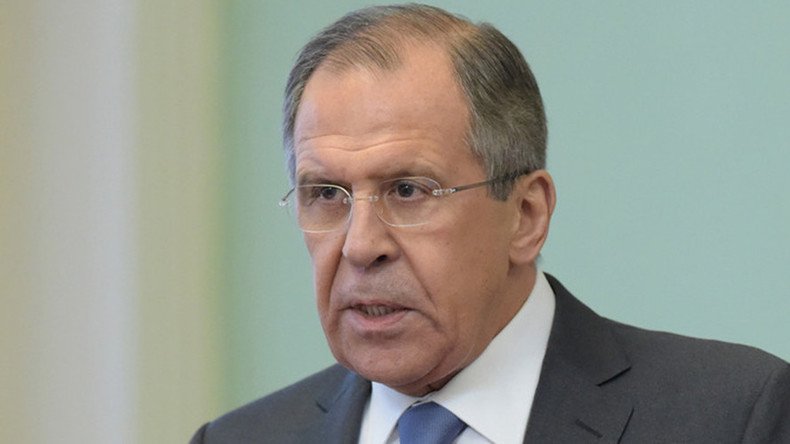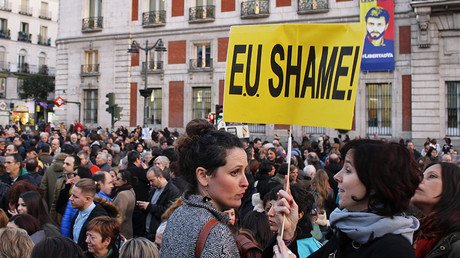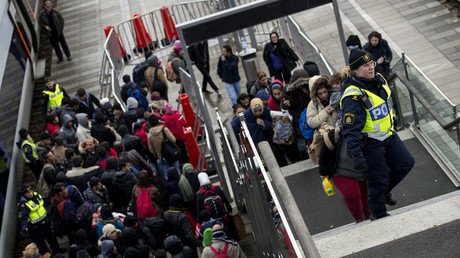'Europe turns into region that projects instability outwards' - Russian FM Lavrov

Europe is turning into a region which projects instability outside its borders, Russian Foreign Minister Sergey Lavrov has stated.
"Russia is part of the global world that keeps changing before our very eyes. New centers of growth and influence emerge and strengthen like, first and foremost, the Asia-Pacific region,” Lavrov said at a meeting with representatives of NGOs on Thursday.
“At the same time, we have been witnessing such an unusual phenomenon as the transformation of Europe into a region that is projecting outwards not the traditional well-being, but instability,” he added.
Europe is currently facing its worst refugee crisis since World War II. Last year alone some 1.8 million asylum-seekers entered the European Union fleeing war and poverty in Middle-Eastern countries, according to data from the European Union border agency Frontex.
Italy’s Economy Minister Pier Carlo Padoan said last month that Europe is becoming a “bad word” due to the growing inequality among EU countries trying to cope with the refugee crisis.
In an effort to tackle the biggest migrant crisis in decades, the EU and Ankara signed the migrant deal in March, according to which Turkey would take back refugees seeking asylum in the EU in exchange for a multi-billion euro aid package and some political concessions, including the visa-free regime.
A report from the European Commission reportedly warned last month that the proposed visa-free arrangement with Ankara could actually result in terrorists and criminals flocking to Europe along with Turkish citizens.
“It can be expected that, as soon as Turkish citizens will obtain visa-free entry to the EU, foreign nationals will start trying to obtain Turkish passports in order to pretend to be Turkish citizens and enter the EU visa free, or use the identities of Turkish citizens, or to obtain by fraud the Turkish citizenship,” the Telegraph, which saw the paper, cited it as saying.
Organized crime has been taking advantage of the European migrant crisis to ramp up human trafficking, with an increasing number of children forced into slavery, another EU report warned in May.
Over half of those trafficked to the EU were young women brought for sexual exploitation, the paper said.
“It’s morally and legally unacceptable that in today’s Europe there are women, men, boys and girls who are bought, sold and exploited like commodities,” EU Migration and Home Affairs Commissioner Dimitris Avramopoulos noted, presenting the report in Brussels.
According to Myria Vassiliadou, the EU’s anti-trafficking coordinator, child trafficking has been increasing "very sharply, with 2500 registered victims."
“This is a very worrying trend, particularly with the migration wave, we’ve seen an increase of victims arriving from Libya,” she added.
In fact, intervention in Libya and the removing of Gaddafi was the most ill-conceived step taken by the EU, Professor Kees van der Pijl from Sussex University told RT on Monday.
“Whatever Brussels, NATO, and British flagships, etc. may do – the first thing they should not have done was to intervene in Libya... At some point the objective situation as it is becomes almost impossible to manage. And I think we are in that situation. There is a massive surplus of population in areas where it’s no longer possible to live a decent life,” he said.
Europe has been recently hit hard by a series of terrorist attacks. Four months after 130 people died in a series of coordinated attacks in Paris in November, 32 people were killed in several terror attacks in Brussels. Europe's biggest airports and a number of key locations across the major cities have seen their security heightened as the level of terror threat remains high.
On Tuesday, the US State Department alerted American citizens to the “risk of potential terrorist attacks throughout Europe.” It said that tourists visiting Europe this summer will present “greater targets for terrorists planning attacks in public locations, especially at large events."















